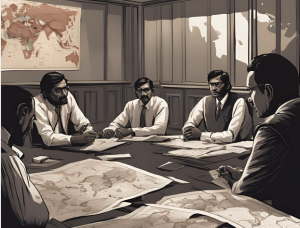In an era characterized by shifting geopolitical landscapes and increasing economic interdependence, the strengthening of diplomatic ties between countries is crucial for addressing global challenges. A significant milestone was achieved when the Head of State of Germany visited India for a bilateral meeting with Prime Minister Narendra Modi.
This visit is emblematic of a deepening relationship that has far-reaching implications for both nations and the global order. The meeting was not just a formality; it was a strategic initiative that signals the importance of India in Germany’s foreign policy and the broader European context.
1. Context of the Visit
The German Head of State’s visit is significant, especially considering the backdrop of global challenges such as climate change, economic uncertainty, and security threats from revisionist powers. India, with its burgeoning economy, young population, and strategic position in South Asia, is increasingly viewed as a vital partner for Germany and Europe at large. As both countries navigate the complexities of international relations, the strengthening of their bilateral ties is pivotal.
1.1 The Global Significance of India
India has emerged as a key player in the global arena, recognized for its rapid economic growth and potential to influence global governance. With a population exceeding 1.4 billion, India presents a vast market for German products and services. The country’s strategic location, bridging East and West, further enhances its importance in international trade and diplomacy. As major economies, Germany and India have a mutual interest in enhancing their cooperation in various sectors, including technology, defense, and trade.
1.2 India’s Role in Global Governance
India’s participation in international forums such as the G20, BRICS, and the United Nations underscores its commitment to global governance. As a proponent of multilateralism, India seeks to reform international institutions to reflect contemporary realities. Germany’s acknowledgment of India’s role in these discussions highlights a shared vision for a more equitable global order.
2. The “Focus on India” Document
Prior to the visit, Germany released an important document titled “Focus on India.” This document is pivotal in shaping the future of India-Germany relations, outlining Germany’s strategic intentions toward India. It reflects a paradigm shift in how Germany perceives its relationship with India, moving from a cautious approach to a more proactive partnership.
2.1 Overview of the Document
The “Focus on India” document is historic, marking the first time a major Western European country has released a comprehensive policy framework dedicated solely to India. This initiative is indicative of Germany’s recognition of India as a key strategic partner. The document outlines a roadmap for collaboration across various sectors and establishes a framework for future engagements.
2.2 Key Areas of Cooperation
The document identifies three primary pillars for cooperation: technology, trade, and migration. These areas are crucial for enhancing bilateral relations and fostering mutual growth.
2.3 Technology Transfer
Germany is renowned for its technological advancements and expertise in various sectors, including renewable energy, manufacturing, and digital technologies. The document emphasizes the potential for technology transfer between the two nations. India stands to benefit immensely from German innovations, which can help accelerate its development goals.
2.4 Renewable Energy Collaboration
One of the most pressing issues facing both countries is climate change. Germany has been a leader in renewable energy technology, and India, with its ambitious targets for solar and wind energy, is poised to benefit from German expertise. Collaborative projects in renewable energy can pave the way for sustainable development and energy security for both nations.
2.5 Digital Transformation Initiatives
The digital revolution is reshaping economies worldwide. India, with its vast IT industry, is well-positioned to collaborate with Germany in areas such as artificial intelligence, cybersecurity, and digital infrastructure. Joint initiatives can enhance digital capacities and foster innovation, positioning both nations as leaders in the global digital economy.
2.6 Trade Relations
Trade relations between India and Germany have historically been strong, but there is potential for significant expansion. The document underscores the need for both countries to explore new markets and enhance trade agreements to facilitate smoother commerce.
2.7 Expanding Market Access
Germany is one of India’s largest trading partners in Europe, with bilateral trade exceeding €20 billion annually. The document emphasizes the importance of reducing trade barriers and enhancing market access for Indian products in Germany and vice versa. By exploring free trade agreements, both countries can unlock new economic opportunities.
2.8 Investment Opportunities
Germany is a significant source of foreign direct investment in India. The document highlights the potential for increasing German investments in sectors such as manufacturing, automotive, and infrastructure. By fostering a conducive environment for investment, both countries can enhance economic collaboration and job creation.
2.9 Migration and Skilled Labor
Migration has emerged as a critical aspect of India-Germany relations. The document emphasizes the importance of skilled Indian professionals in Germany’s labor market. With an aging population, Germany is in dire need of skilled labor to sustain its economy.
2.10 Facilitating Skilled Migration
Germany has recognized the value of Indian professionals, particularly in fields such as engineering, IT, and healthcare. By streamlining visa processes and recognizing Indian qualifications, Germany can attract talent from India, contributing to its economic growth.
2.11 Cultural Exchange Programs
Cultural exchange programs can foster mutual understanding and respect between the two nations. Initiatives such as student exchanges, internships, and research collaborations can enhance people-to-people connections, laying the groundwork for a stronger bilateral relationship.
3. Addressing Historical Challenges
3.1 Shifts in German Perspectives
Historically, Germany has maintained a cautious approach to India, often influenced by its relationships with other countries. However, the “Focus on India” document reflects a significant shift in German perspectives, recognizing India’s growing importance in global affairs.
3.2 Understanding India’s Position
Germany has come to understand that India’s relationship with Russia, particularly in defense, is based on strategic needs rather than ideological alignment. The document indicates a matured understanding that India must be respected as an independent actor in international relations.
3.2.1 Arms Exports from Germany
Germany’s willingness to export arms to India marks a watershed moment in their relationship. This is not merely about arms trade; it represents a broader commitment to enhancing India’s defense capabilities and reducing its reliance on Russian supplies. By fostering defense cooperation, both countries can strengthen their strategic partnership.
3.2.2 Joint Defense Projects
The potential for joint defense projects, such as manufacturing military equipment and technology transfer, is a significant aspect of this relationship. Collaborative efforts in defense not only enhance security but also promote economic growth through job creation and technology development.
4. Regional Security Dynamics
4.1 Identifying Revisionist Powers
The document highlights the concept of revisionist powers in the context of regional security. India faces challenges from China, while Germany contends with Russia. This shared understanding creates a basis for collaboration on security matters.
4.2 Collaborative Security Approaches
Both countries have agreed to develop strategies to manage these regional threats. Recognizing that their cooperation can yield benefits for both sides, they are exploring joint initiatives in defense and intelligence-sharing.
4.2.1 Joint Diplomatic Initiatives
Germany and India have committed to joint diplomatic initiatives that promote peace and stability in their respective regions. This collaboration not only strengthens bilateral ties but also enhances their global standing as responsible powers.
4.2.2 Peacekeeping and Humanitarian Efforts
Both nations have a history of participating in peacekeeping missions under the auspices of the United Nations. Their collaboration in humanitarian efforts can also serve as a platform for strengthening diplomatic ties and addressing global crises.
5. The Concept of Socio-Ecological Security
5.1 Introduction to Socio-Ecological Security
During the visit, India and Germany discussed the innovative concept of “Socio-Ecological Security.” This concept focuses on addressing global warming and climate change, particularly in vulnerable regions. By adopting a holistic approach that integrates social, ecological, and economic dimensions, both countries aim to tackle one of the most pressing challenges of our time.
5.2 Engaging Vulnerable Countries
Germany and India have identified 20 vulnerable countries that will benefit from their collaborative efforts in climate change mitigation. This approach not only aids these nations but also enhances India’s international reputation as a leader in sustainable development.
5.2.1 Climate Resilience Programs
Joint programs aimed at enhancing climate resilience in vulnerable countries can serve as a model for global cooperation. By sharing best practices and technologies, both nations can contribute to building adaptive capacities in regions facing the brunt of climate change.
5.2.2 Technology Transfer for Sustainable Development
The transfer of technology for sustainable development is crucial for empowering vulnerable nations. By providing access to renewable energy solutions and sustainable agricultural practices, India and Germany can play a pivotal role in fostering resilience and promoting development.
6. Strengthening the Global South
6.1 Leadership Role for India
Germany has explicitly stated its support for India’s ambition to lead the Global South. This marks a shift in international dynamics, recognizing India’s potential to unify and represent the interests of developing nations.
6.2 Cooperative Initiatives for Development
By cooperating on development initiatives, both countries aim to address pressing issues such as climate change, poverty, and inequality in vulnerable countries. This collaboration positions India as a leader in global discourse and empowers developing nations to voice their concerns.
6.3 Cooperative Initiatives for Development (continued)
6.3.1 Sustainable Development Goals (SDGs)
Both nations have expressed commitment to achieving the United Nations Sustainable Development Goals (SDGs). By collaborating on initiatives that target these goals, particularly in education, health, and environmental sustainability, India and Germany can enhance their standing as champions of global development.
6.3.2 Capacity Building in Developing Nations
India’s experience in capacity building can be leveraged to assist other developing nations. Germany’s support in terms of funding and technical expertise can create a robust framework for knowledge transfer, empowering nations to achieve sustainable development.
7. Cultural Diplomacy
7.1 The Importance of Cultural Exchange
Cultural diplomacy plays a vital role in strengthening bilateral ties. The mutual appreciation of each other’s heritage fosters goodwill and understanding. Programs promoting cultural exchange, such as arts, music, and education, contribute to deeper people-to-people connections.
7.2 Educational Partnerships
Educational collaborations between Indian and German institutions can enhance academic exchanges and research partnerships. By facilitating student exchanges, joint research projects, and scholarship programs, both countries can nurture a generation of leaders who understand and appreciate each other’s cultures.
7.2.1 Promoting Language Learning
Language learning is a key component of cultural exchange. Initiatives to promote the German language in India and vice versa can bridge cultural gaps and foster communication. This effort can also prepare students for professional opportunities in each country.
7.3 Tourism Initiatives
Promoting tourism between India and Germany can bolster economic ties and deepen cultural understanding. Initiatives aimed at facilitating travel, such as joint tourism campaigns and simplified visa processes, can enhance people-to-people interactions and economic benefits.
Read Also : Protect Hindus: A Call to Action Amid Rising Religious Persecution
8. Economic Cooperation: A Path Forward
8.1 Trade Agreements and Economic Partnerships
To realize the potential of their economic relationship, India and Germany must pursue comprehensive trade agreements that lower tariffs and facilitate investment. Both nations can benefit from stronger economic partnerships, especially in sectors such as manufacturing, technology, and renewable energy.
8.2 The Role of the Private Sector
The private sector plays a crucial role in driving economic collaboration. Encouraging joint ventures, collaborations, and partnerships between Indian and German companies can enhance innovation and create new markets.
8.2.1 Fostering Innovation
Innovation is at the heart of economic growth. By promoting research and development initiatives, both countries can foster a culture of innovation that enhances their competitiveness on the global stage. Initiatives such as innovation hubs and research centers can facilitate collaboration between industries and academia.
8.3 Addressing Trade Imbalances
Addressing trade imbalances is essential for sustainable economic cooperation. Germany’s focus on increasing imports from India can create a more balanced trade relationship. By promoting Indian products in Germany, both nations can enhance their economic ties.
9. Conclusion: A New Era of India-Germany Relations
The visit of the German Head of State to India marks a transformative moment in the bilateral relationship between the two nations. With a shared vision for the future, India and Germany are poised to deepen their cooperation across various sectors. The “Focus on India” document lays the foundation for a comprehensive partnership that addresses economic, security, and environmental challenges.
9.1 Strategic Partnership for the Future
As India emerges as a global player and Germany seeks to enhance its role in the Indo-Pacific region, the strategic partnership between the two nations will play a pivotal role in shaping the future of international relations. By fostering collaboration in technology, trade, and security, India and Germany can address pressing global challenges and set a benchmark for cooperation.
9.2 A Shared Commitment to Global Challenges
The commitment to tackle climate change, promote sustainable development, and enhance regional security reflects a shared vision that transcends borders. As both nations work together to address these challenges, they are not only strengthening their bilateral ties but also contributing to a more stable and prosperous global order.
9.3 Looking Ahead: A Bright Future
The future of India-Germany relations looks promising, with opportunities for collaboration across various sectors. As both nations navigate the complexities of a changing world, their partnership will continue to evolve, shaping a new era of cooperation that can serve as a model for other countries.
10. References
- Government of India. (2024). India-Germany Strategic Partnership: A Vision for the Future. Retrieved from Government of India
- Federal Foreign Office, Germany. (2024). India and Germany: A Growing Partnership. Retrieved from Auswärtiges Amt
- Ministry of External Affairs, India. (2024). Bilateral Relations: India-Germany. Retrieved from MEA India
- The Economic Times. (2024). India-Germany Trade Relations: Current Status and Future Prospects. Retrieved from Economic Times
- World Bank. (2024). Sustainable Development Goals: India and Germany. Retrieved from World Bank
- OECD. (2024). Strengthening Global Trade: India and Germany’s Role. Retrieved from OECD
- The Hindu. (2024). Cultural Diplomacy between India and Germany: Building Bridges. Retrieved from The Hindu
- Institute of International Relations. (2024). Bilateral Cooperation in Technology and Innovation: India and Germany. Retrieved from IIR






Be First to Comment